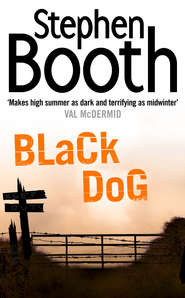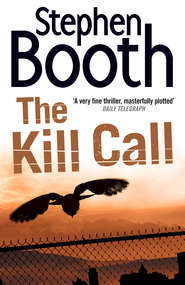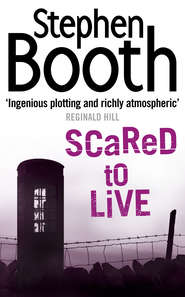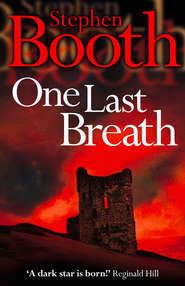По всем вопросам обращайтесь на: info@litportal.ru
(©) 2003-2024.
✖
Cooper and Fry Crime Fiction Series Books 1-3: Black Dog, Dancing With the Virgins, Blood on the Tongue
Автор
Год написания книги
2018
Настройки чтения
Размер шрифта
Высота строк
Поля
Fry was interested to see that a name had been offered up to police as a ‘possible’ right from the start. A youth called Lee Sherratt had been named by the parents and had been interviewed by officers in the initial sweep. He had denied being the young man seen talking to Laura, but his alibi was unsupported. Sherratt’s record had been pulled from the Police National Computer – a few petty crimes, some as a juvenile. It wasn’t much, but it was enough to leave his name at the top of the file until he could be eliminated.
According to the reports, a uniformed inspector from Operational Support was now in charge of the search on the ground. DI Paul Hitchens was CID investigating officer, reporting to Detective Chief Inspector Stewart Tailby. Officers had already called at every house in the village of Moorhay, since there weren’t all that many. Enquiries had been made with all known friends and relatives in the area. No sign of Laura Vernon, no leads to her possible whereabouts.
By now the painstaking inch-by-inch search of the surrounding countryside was well under way – off-duty officers had been called in, the search dog teams were out and the helicopter was in the air. Peak Park Rangers and Countryside Rangers were helping the search, and the Mountain Rescue Team was somewhere up on the tops of the moors above the village. And, of course, Detective Constable ‘Mr Perfect’ was also out at Moorhay in person. Case solved, then.
Fry had met DI Hitchens on her first day. He was her CID boss – after DS Rennie, anyway, and she had already decided Rennie didn’t really count. Hitchens was younger than the sergeant, and better educated. So an early promotion; maybe he was a fast-track graduate, like herself. He would certainly be destined for higher things, and his voice would be listened to by more senior officers. Fry ached to be out there, on a major enquiry, at the right hand of DI Hitchens, getting the chance to impress. She wasn’t intending to hang around looking at car crime statistics for long. A murder enquiry was just the thing. But it had come too soon, while she was still too new. Hence her presence in the office with Rennie.
In an hour or two they would have to call off the search for Laura Vernon anyway. Even in August dusk fell eventually over the hills, and the lines of men and women would disperse and wander dispiritedly home. Tomorrow there would be appeals in the papers and on TV, and civilian volunteers would be queueing up to swell the numbers of the search parties.
Fry knew she had two choices. She either coasted along and filled in time until Rennie thought fit to allocate her some tasks; or she could speak up, take the initiative, start to show what she was made of. But she held her tongue. Now was not the time – she needed to be in a stronger position. Meanwhile, DS Rennie was not worth the effort of trying to impress.
Then the door opened and DI Hitchens put his head round. ‘Who’s here? Oh yes.’
He looked disappointed, like a captain left with the choice of the players no one wants when the teams are being chosen. Hitchens was in his shirt sleeves, with his cuffs rolled up a few inches over strong wrists covered in dark, wiry hair. He was in his thirties, and seemed to be permanently about to break into a smile. Fry caught his eye, looked from him to Rennie, who had barely moved except to shift his foot from his desk.
Hitchens nodded. ‘All right to hold the fort for a while, Dave?’
‘Sir.’
Fry jumped up eagerly. ‘Where are we going, sir? Is it the missing girl, Laura Vernon?’
‘What else? Yes, we’ve had a find called in. We’ve got a good man out in the field now checking it out, but it sounds positive. Can you be ready in two minutes?’
‘I’ll be ready.’
When the DI had left, Diane Fry went back to her desk to clear away the car crime reports. She was careful to turn her back to Dave Rennie, so that he wouldn’t see her smiling.
Edendale sat astride a wide valley in the gap between the two distinct halves of the Peak District. On one side the gentle limestone hills and wooded dales of the White Peak rolled away past Bakewell and Wyedale into B Division and the borders of Staffordshire. On the other side were the grim, bare gritstone moors of the sparsely populated Dark Peak, where the high slopes of Mam Tor and Kinder Scout guarded the remote, silent reservoirs below Snake Pass.
It was one of only two towns that sat within the boundaries of the Peak District National Park – the other being Bakewell, a few miles to the south, where one of the E Division section stations was based. Other towns, like Buxton, headquarters of B Division, had been deliberately excluded from the National Park when the boundaries were drawn.
At Buxton, as at Matlock and Ashbourne, the boundary took wide sweeps around the towns and back again. But Edendale was too deep within the hills to be excluded. It meant that the restrictive Peak Park planning regulations applied to the town as much as they did to the face of Mam Tor or to the Blue John caves of Castleton.
Diane Fry was still learning the geography of the town and the dale. So far she was familiar only with the immediate area around the Victorian house on the outskirts of Edendale where she had rented a first-floor flat, and the streets near the station – including the view of the Edendale FC stand. But she was aware that, no matter which route you chose out of Edendale, the only way was up – over the hills, to the moorland hamlets or the villages in the next valley.
Fry was a good driver, trained in the West Midlands force driving school to handle pursuit cars. But DI Hitchens chose to drive himself as they headed out of the town towards the great hump of moorland separating Edendale from the next valley.
‘It’s just the one shoe,’ said Hitchens.
‘A trainer?’ said Fry. ‘Reebok, size-five?’
The DI looked at her, surprised, raising his eyebrow.
‘You’ve been reading up on the Vernon enquiry.’
‘Yes, sir.’
‘It was always a possibility from the start that something had happened to her, though you can’t tell the parents that. She had cash with her, but had taken nothing else. We’d already traced all her friends and contacts. Negative all round. It’s inevitable, I’m afraid, that her body will turn up somewhere.’
‘What sort of girl is she?’
‘Oh, comes from a well-off family, comfortable background. Never wanted for anything, I’d say. She attends a private school called High Carrs, due to take her GCSEs next year. She gets piano lessons, has a horse that her parents bought that’s kept at some stables just outside Moorhay. She takes part in riding events sometimes.’
‘Show jumping?’
‘I suppose so.’
‘And is she good at any of those things?’
Hitchens looked at her and nodded approvingly. ‘If you believe the parents, she’s perfect at everything. Bound to get a place at Oxford or Cambridge and do her degree, but might decide to pursue a career as a concert musician later on. Unless she wins an Olympic gold medal in the meantime, of course. Her friends say different.’
‘Boys?’
‘Of course. What else? Mum and Dad deny it, though. They say she’s too busy with her studies and her horse riding, all that. But we’re tracing the boyfriends, gradually.’
‘Rows at home? Anything like that?’
‘Nothing. At least …’
‘Not according to the parents, right.’
‘Got it.’
Hitchens was smiling again. Fry liked her senior officers to smile at her, within reason. She watched his hands on the steering wheel. They were strong hands, with clean and carefully trimmed fingernails. His nose was a little too large in profile. It was what they called a Roman nose. But a man could get away with that – it gave him character. She looked again at his left hand. There was no wedding ring on his finger. But now she noticed a white scar that crawled all the way across the middle knuckles of three of his fingers.
‘The parents say that Laura had been shopping with her mother that afternoon,’ said Hitchens. ‘They’d been to the De Bradelei Centre at Belper.’
‘What’s there?’
‘Oh – clothes,’ he said vaguely.
‘Not Dad?’
‘I don’t suppose it was his sort of thing. Anyway, the females were buying him a birthday present, so he wouldn’t have been wanted, would he? He stayed at home to catch up on some work. Graham Vernon runs a financial consultancy business and says it’s going well. They do seem to be pretty well-off.’
‘And after they got home?’
‘It was about half past five by then. It was still hot, so Laura changed and went out into the garden for a while. She didn’t come back for her evening meal at half past seven. That’s when the Vernons began to panic.’
Fry admired the way he had all the details in his mind and could produce them without effort. Hitchens obviously had the sort of brain that was much valued in the police service these days. Many coppers could not have repeated the information without reading it from their notes.
‘Parents alibi each other?’
‘Yes.’
‘But she was seen talking to a young man before she disappeared, wasn’t she?’
‘Very good, Diane. Yes, we found a lady who was out collecting wild flowers on the edge of the scrubland at the top of the Baulk. She’s a WI member and is helping to create the decoration for a well dressing at Great Hucklow. She was embarrassed about admitting it, can you believe it? She thought we might arrest her for stealing wild flowers. Her children had told her it’s a crime against the environment. But the well dressing was obviously important enough to turn her to evil ways. Anyway, she came forward and identified Laura Vernon from her photograph as the girl she saw. She couldn’t describe the boy, though. Too far away.’











